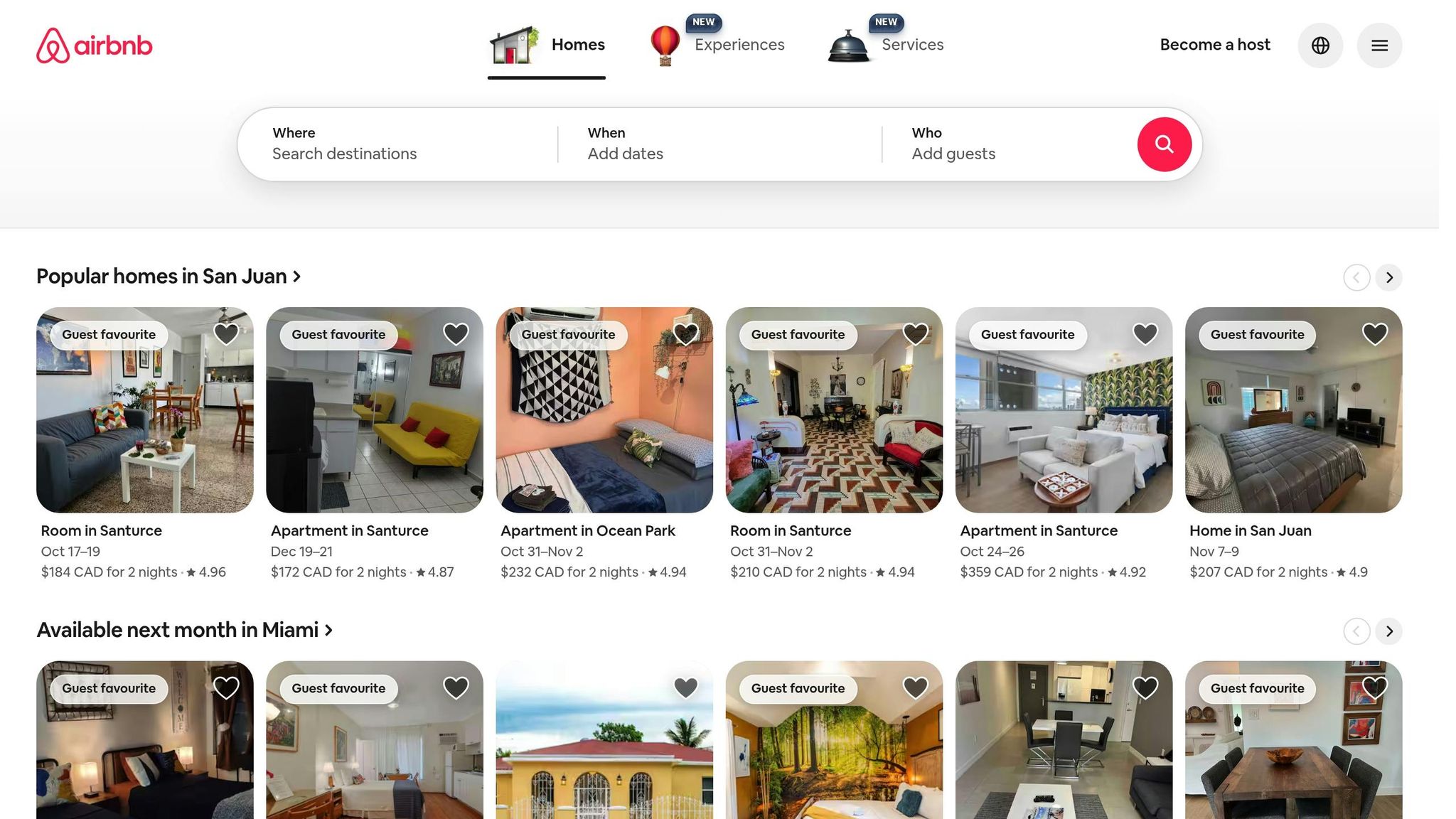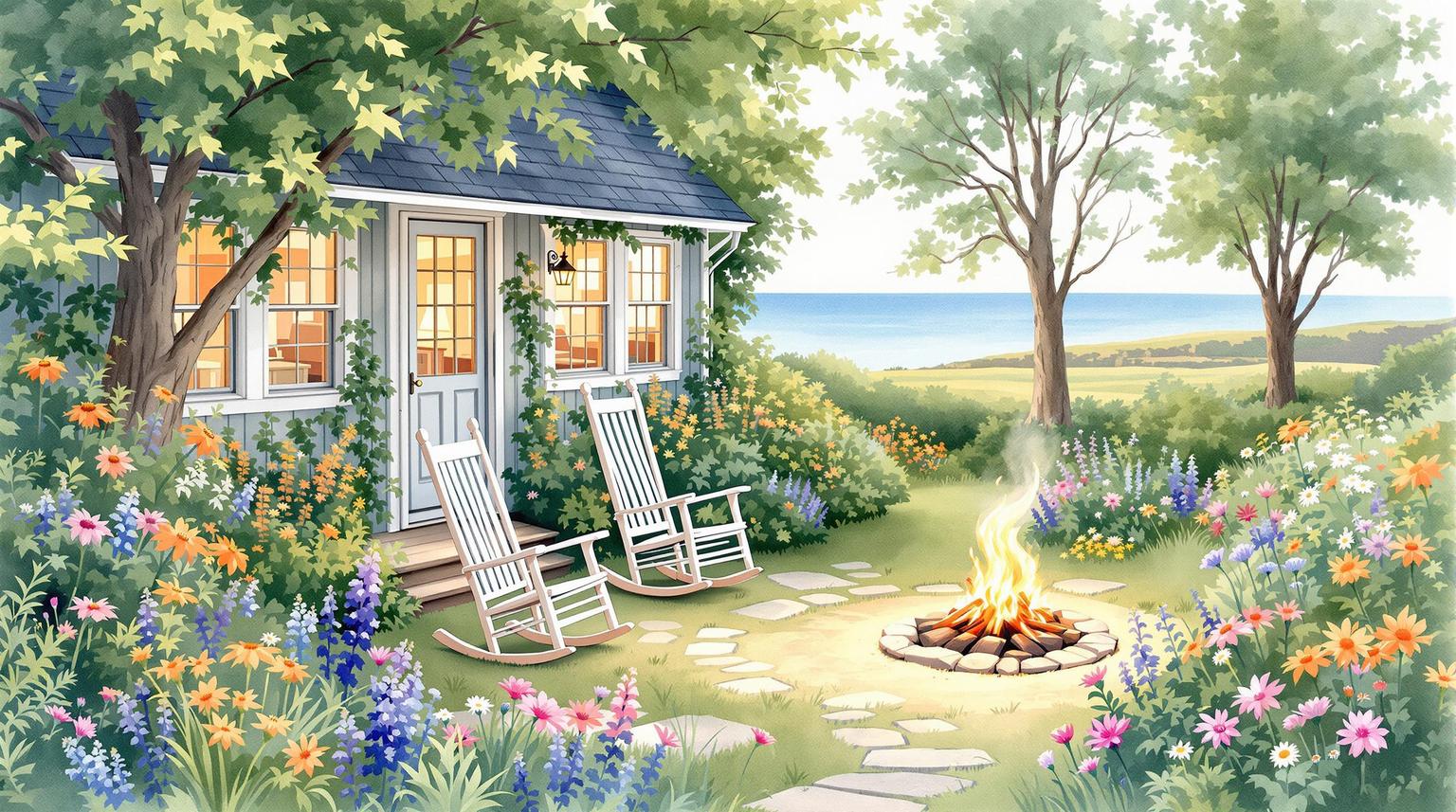Turning your second home in Windsor or Hantsport into a short-term rental (STR) offers a chance to earn income while catering to the area’s steady tourism demand. These Nova Scotia communities are popular for their wineries, scenic coastlines, and small-town charm, making them ideal for STRs. However, success depends on meeting local regulations, creating a guest-friendly space, and managing operations effectively. Here’s what you need to know:
- STR Definition in Nova Scotia: Rentals under 28 consecutive days.
- Why Windsor and Hantsport: Proximity to wineries, the Bay of Fundy, and Halifax. Seasonal tourism ensures year-round demand.
- Regulations: Provincial rules require STR registration, safety compliance (smoke detectors, exits), and HST remittance. Municipal rules vary, including zoning, parking, and occupancy limits.
- Preparing Your Property: Focus on safety upgrades, comfortable furnishings, and guest-friendly amenities like smart locks and local touches.
- Management Tips: Use professional services or technology for pricing, guest communication, and maintenance to save time and boost earnings.
Converting a House Into an Airbnb (Everything You Need To Know!)

Local and Provincial STR Regulations You Need to Know
If you're running a short-term rental (STR) in Windsor or Hantsport, you need to follow both Nova Scotia's provincial guidelines and the specific rules set by local municipalities. These regulations are designed to ensure guest safety, protect neighbourhoods, and maintain fairness in the tourism industry. It's crucial to understand your property's requirements right away to avoid penalties. Below, we’ll break down Nova Scotia’s general regulations and the specific rules for Windsor and Hantsport.
Provincial STR Requirements in Nova Scotia
In Nova Scotia, operating an STR typically requires registering your property with the provincial government. The province generally defines a short-term rental as an accommodation offered for brief stays, so confirming how your property fits this definition is a must.
To meet safety standards, make sure your property has working smoke and carbon monoxide detectors, and clearly mark emergency exits. Check for any additional safety measures outlined in the latest provincial regulations.
You’ll also need to fulfil tax obligations, such as collecting and remitting HST, and updating your insurance to cover commercial use. Ignoring these requirements could result in hefty penalties, so keeping all necessary documentation and licences current is essential.
Municipal Rules in Windsor and Hantsport
Windsor: STR operators in Windsor must obtain a business licence. Local bylaws often address parking, noise control (including quiet hours), and guest limits based on the size of the property and surrounding infrastructure. If you’re not living nearby, you may also need to designate a local contact person to handle any issues that arise.
Hantsport: In Hantsport, STR operators are required to register with the municipal office and pay an annual fee. Regulations here include parking standards and, during busy seasons, may impose limits on occupancy to manage traffic and maintain neighbourhood balance.
Both municipalities require that properties maintain a residential appearance. Any exterior changes or signage beyond basic property identifiers might need additional permits. Zoning rules can also vary - some areas may only allow STRs in owner-occupied homes, while others may limit the number of licences issued. Knowing these local rules is key to meeting regulatory demands and keeping your guests happy.
How to Stay Compliant Over Time
Staying compliant isn’t a one-time task. STR regulations can change as local governments respond to community concerns and shifts in tourism. To stay ahead, regularly review updates, renew licences on time, and adjust your practices as needed.
Consider setting up alerts for bylaw changes or joining local STR operator groups to stay informed about new rules. It’s also a good idea to review your insurance coverage annually and keep detailed records, including guest registries, tax documents, safety inspections, and any communication with municipal offices. This ensures you’re ready for audits or inspections.
For many property owners, working with a professional management service, like Casa Scotia, can simplify compliance. These services can help track local requirements, manage licence renewals, and organize your documentation, allowing you to focus on delivering a great guest experience. Keeping your paperwork updated and staying informed about local changes will help set your STR up for long-term success.
Getting Your Second Home Ready for STR Use
Turning your second home into a short-term rental (STR) takes careful planning and some thoughtful upgrades. The aim is to create a welcoming space that meets safety standards while offering guests an experience worth the premium rates. Your property should function as both a well-run business and a comfortable retreat.
Property Upgrades and Maintenance You'll Need
Safety is the backbone of any STR. Beyond meeting regulatory requirements, consider adding motion-sensor lighting, secure railings, and non-slip surfaces - especially important during icy winters.
Have professionals inspect electrical and plumbing systems before hosting. Upgrading outlets to GFCI, adding USB charging stations, and installing a tankless water heater can help meet the needs of your guests.
Adding accessibility features can attract a wider range of visitors. Simple changes like grab bars, wider doorways for mobility aids, and a step-free entrance can make your property more appealing.
Comfort is key, so climate control should be a priority. Efficient heating and programmable thermostats allow you to maintain a cosy environment for guests while keeping energy costs in check.
Staging and Furnishing to Attract Guests
Once the essential systems are in place, focus on creating an interior that feels inviting and modern.
Choose furniture that combines durability with style. Neutral-toned pieces made from materials like solid wood or performance fabrics are both practical and visually appealing.
Equip the kitchen with quality essentials. Stock it with everything from sturdy cookware to small appliances like a coffee maker and microwave. Guests will appreciate having all the tools they need for a convenient stay.
For the bedrooms, invest in comfort. A good mattress is a must, and offering a variety of pillow options can cater to different preferences. Layer bedding with duvets, extra blankets, and throws, and install blackout curtains or blinds to help guests enjoy a restful night’s sleep.
Setting Up a Guest-Friendly Space
Creating a seamless experience goes beyond aesthetics - logistics matter too.
Clear and accessible communication systems are crucial. A detailed welcome guide should include WiFi passwords, appliance instructions, emergency contacts, and checkout steps. Provide both printed and digital versions so guests can easily find what they need.
Thoughtful amenities can elevate the guest experience. Stock bathrooms with high-quality toiletries, extra towels, and even a basic first aid kit. Depending on your location, consider offering items like beach towels, hiking gear, or board games. A selection of books, maps, or guides to local activities can also add a personal touch.
Integrating technology can simplify both guest stays and property management. Smart locks allow for keyless entry, while smart TVs and strong WiFi meet modern expectations for connectivity and entertainment.
Adding local touches can make your property stand out. In areas like Windsor and Hantsport, where local charm is a draw, consider including Nova Scotia-inspired items like maple syrup, local wines, or artisanal products in welcome baskets. Highlight nearby attractions and hidden gems in a curated guide to help guests explore the area.
Lastly, ensure maintenance accessibility. Clearly label utility controls like circuit breakers and water shut-offs, and keep basic tools handy for minor repairs. These small steps not only improve guest comfort but also help you stay compliant with local regulations.
sbb-itb-b5e1074
STR Management Strategies That Work
Managing a short-term rental (STR) successfully involves far more than simply offering a stylish, well-decorated property. It requires consistent attention to management, strategic pricing, and creating seamless guest experiences. By combining technology with professional services, you can streamline operations and maximize your returns while minimizing the time and effort needed.
Hands-Free Management Options
Earning income from an STR is attractive, but the day-to-day responsibilities can be overwhelming. Full-service management takes care of time-consuming tasks like coordinating cleaning, screening guests, and navigating local regulations.
Take Casa Scotia, for example. This company provides a full suite of services, including guest screening, communication, and cleaning coordination. Their approach ensures that your property meets high standards while delivering steady income - without the stress of managing it yourself. Professional managers also bring valuable knowledge of local market trends, helping you avoid common mistakes that could lead to bad reviews or regulatory issues.
Experienced managers fine-tune pricing and occupancy strategies to capitalize on peak summer demand while maintaining off-season bookings. Guest screening adds an extra layer of security by assessing potential guests based on their booking history, communication habits, and adherence to house rules. This process reduces risks and helps create a positive experience for both you and your guests.
Technology plays a crucial role in enhancing these management practices.
Using Technology for STR Success
Once professional services are in place, digital tools can further improve efficiency and transparency. For instance, owner portals provide real-time updates on your property's performance. You can track bookings, review financial metrics, and monitor maintenance needs - all from the convenience of your smartphone or computer.
Calendar synchronization is another game-changer. Integrated systems automatically update your property's availability across platforms like Airbnb and Vrbo, eliminating the risk of double bookings. This ensures a smooth experience for guests while saving you from potential scheduling headaches.
Detailed financial reports are also invaluable. These reports typically include data like occupancy rates, average nightly prices, cleaning expenses, and net income. Such insights make it easier to identify peak periods and areas where operations could be improved.
Automation is a key player when it comes to guest communication. Routine interactions - such as booking confirmations, check-in instructions, and follow-up messages - can be handled by automated systems. This not only saves time but also ensures that guests receive timely and accurate information, maintaining high service standards without requiring constant manual effort.
Pricing and Occupancy Optimization
In competitive markets like Windsor and Hantsport, a smart pricing strategy is essential to maximize your revenue. Dynamic pricing is one of the biggest advantages of professional STR management. Instead of setting a static nightly rate, dynamic pricing adjusts based on factors like local demand, seasonal trends, and competitor pricing.
Revenue management takes this a step further by analyzing booking patterns to determine optimal stay lengths, target ideal guest segments, and time rate adjustments to boost both occupancy and income. Metrics like revenue per available night (RevPAN) are often tracked to ensure your property remains competitively priced.
Your property’s market positioning also plays a big role in pricing. Properties that consistently deliver outstanding guest experiences can command higher rates. On the other hand, properties focused on affordability may prioritize higher occupancy with competitive pricing. The goal is to find the right balance that maximizes overall revenue, not just the nightly rate.
Seasonal pricing adjustments are especially important in Nova Scotia’s tourism market. During the summer, high demand supports premium rates, while shoulder seasons might benefit from discounts for longer stays or alternative rental strategies. Winter months, meanwhile, often attract guests looking for seasonal activities or a cozy holiday retreat, requiring thoughtful pricing approaches.
Finally, performance analytics help fine-tune pricing strategies over time. By measuring how rate changes affect bookings and revenue, you can continuously adapt to market conditions, ensuring your property stays competitive and profitable year-round.
Increasing Profits and Improving Guest Experience
Boosting profits and delighting guests in the short-term rental (STR) market go hand in hand. By fine-tuning your approach, you can elevate both your revenue and your guests' stays. These strategies build on earlier efforts like compliance and property preparation, taking your STR success to the next level.
How to Increase Nightly Rates and Occupancy
Showcasing what makes your property special is the key to setting higher nightly rates while keeping occupancy levels strong. In competitive areas like Windsor and Hantsport, features such as stunning waterfront views, proximity to wine country, or a touch of historic charm can help justify premium pricing. Once you’ve set competitive rates, maintaining impeccable cleanliness is a must to ensure guests feel they’re getting value for their money.
Cleaning and Maintenance Standards That Matter
Cleanliness isn’t just a box to check - it’s a game-changer. A spotless property leaves a lasting impression, leading to glowing reviews and repeat bookings. Regular deep cleaning, quick attention to maintenance issues, and thoughtful details like crisp linens and sanitized surfaces create an inviting space that stands out in the local market. These efforts directly support premium pricing and guest satisfaction.
Using Guest Feedback to Improve Your STR
Guest reviews are a goldmine for improvement ideas. Pay attention to what past visitors have praised or suggested - small touches can make a big difference. Items like coffee supplies, plush robes, welcoming gestures, or clear instructions for amenities like hot tubs can enhance the experience. Being responsive to guest feedback not only improves your property but also shows that you value their input. This commitment to quality helps you meet the high expectations of travellers exploring Windsor and Hantsport’s vibrant tourism scene.
Key Steps to STR Success in Windsor and Hantsport
Turning your second home into a thriving short-term rental (STR) in Windsor and Hantsport requires careful planning. Success hinges on balancing local regulations, efficient management, and exceptional guest experiences to ensure your property remains profitable and appealing.
Start with compliance - it’s non-negotiable. Familiarize yourself with Nova Scotia’s provincial STR regulations and the specific municipal rules in Windsor and Hantsport. Keeping your licences current and meeting safety standards not only protects your investment but also ensures smooth operations. Compliance is the bedrock upon which all other strategies are built.
Make your property stand out with thoughtful preparation and staging. Highlight what makes Windsor and Hantsport special. Whether it’s a waterfront view, proximity to wineries, or historic charm, use professional staging and quality furnishings to emphasize these features. A well-prepared property not only attracts more guests but also supports premium pricing.
Streamline operations with efficient management systems. From professional cleaning services to maintenance scheduling and guest screening, having reliable processes in place keeps everything running smoothly. With these systems handling the day-to-day, you can focus on delivering a top-tier guest experience.
Elevate the guest experience to secure repeat bookings and glowing reviews. Spotless cleanliness, quick responses to guest inquiries, and thoughtful touches like welcome gifts or easy check-in instructions can make a big difference. Use guest feedback to refine your offering and create memorable stays that justify higher rates.
FAQs
How can I make sure my short-term rental in Windsor or Hantsport meets all provincial and municipal regulations?
To keep your short-term rental (STR) in Windsor or Hantsport compliant, you’ll need to meet both provincial and local regulations.
At the provincial level, Nova Scotia requires all STR operators to register under the Short-term Rentals Registration Act by 30 September 2024. This involves a few key steps: obtaining a zoning confirmation letter (if applicable), registering through the provincial STR portal, and including your registration number in all advertisements. Registration fees vary between $50 and $2,000, depending on the type and location of your property. Rentals are capped at 28 consecutive days, and personal vacation homes can only be rented for a maximum of 150 days per year. Failure to comply could lead to fines as high as $100,000.
On the local level, Windsor requires a Short-Term Rental Licence, which comes with an initial fee of $232 and an annual renewal fee of $191. Supporting documents like identification, proof of insurance, and a criminal record check are also necessary. In West Hants, the focus is on zoning compliance. You’ll need to apply for a zoning confirmation letter by contacting the planning office, submitting property details, and paying a $50 fee. It's crucial to review the specific rules for your area to avoid any penalties.
What are the best ways to manage my short-term rental property if I live far away?
Managing a short-term rental property remotely doesn’t have to be overwhelming if you use the right mix of strategies and tools. One effective approach is hiring a local property manager. They can take care of essential tasks like guest communication, check-ins and check-outs, cleaning, maintenance, and property inspections. This way, your property stays in top shape, and your guests receive excellent care.
If you’d rather stay directly involved, property management software can be a game-changer. These tools let you automate bookings, process payments, and handle guest messaging with ease. For added convenience, smart home devices - like keyless entry systems and security cameras (as long as they comply with privacy laws) - allow you to monitor and manage your property from a distance. By blending professional services with modern technology, you can save time and create a smooth experience for both yourself and your guests.
What unique features or amenities can I add to my short-term rental in Windsor and Hantsport to create a memorable guest experience and increase its value?
To help your short-term rental in Windsor and Hantsport shine while improving guest satisfaction, try incorporating thoughtful, local touches that make a lasting impression. For instance, welcome your guests with locally sourced goodies like artisanal coffee, handmade soaps, or seasonal treats from nearby vendors. These small but meaningful gestures offer guests a true taste of the area.
You can also spotlight the region’s unique charm by sharing guides or recommendations for local attractions. Suggest places like the Avon River Heritage Museum or events such as the Hantsport Music Festival. Providing information about nearby activities and happenings allows guests to connect with the community and enjoy a richer, more memorable stay.
For an added layer of appeal, consider amenities that reflect the local vibe. Think about cosy furnishings inspired by Nova Scotia's coastal style or outdoor spaces designed to showcase the area’s natural beauty. These thoughtful details not only enhance your guests' experience but can also help justify higher rental rates.



